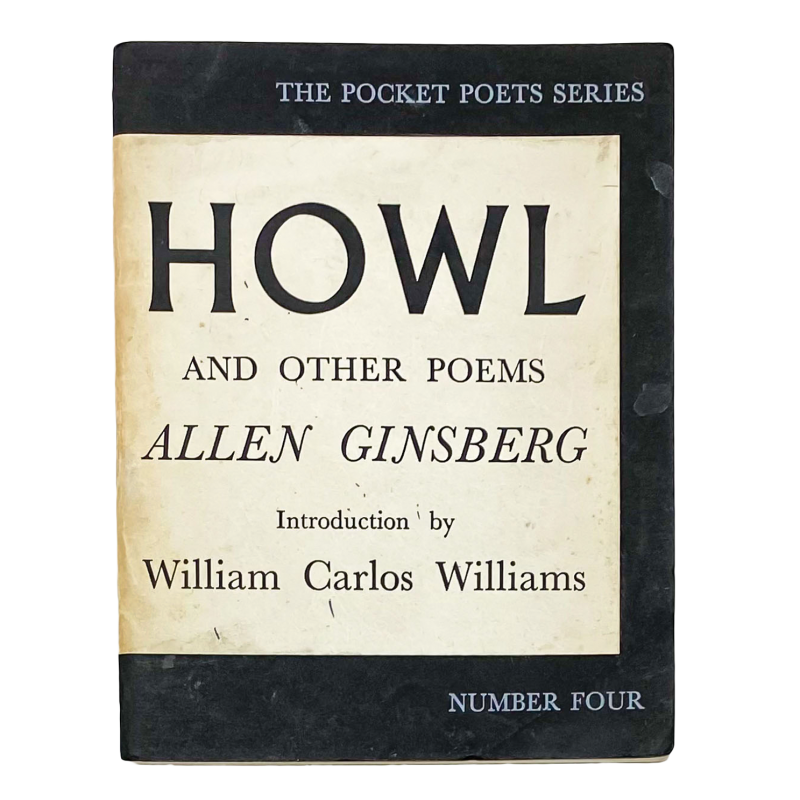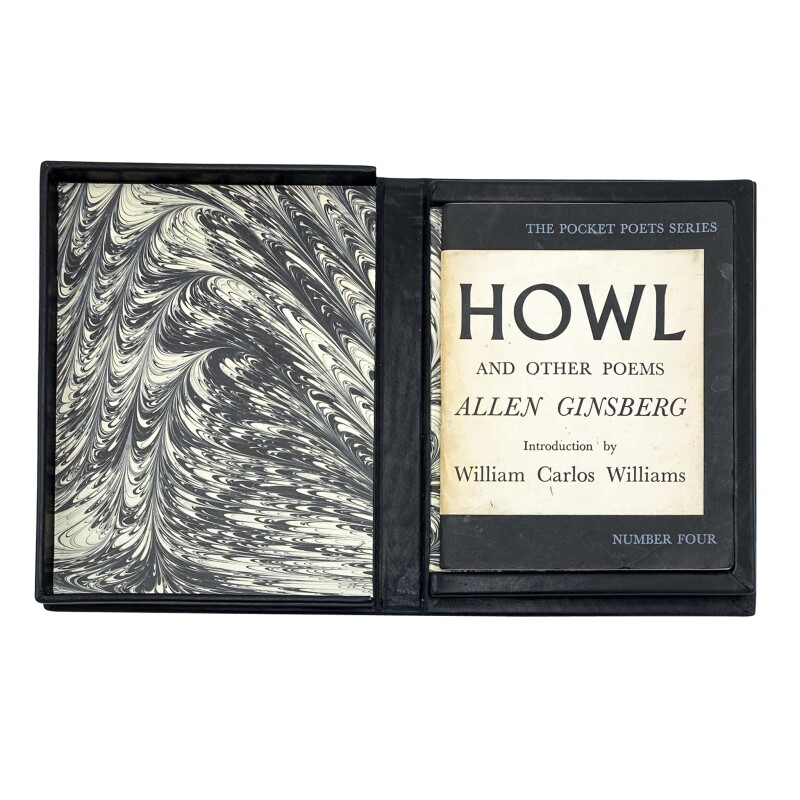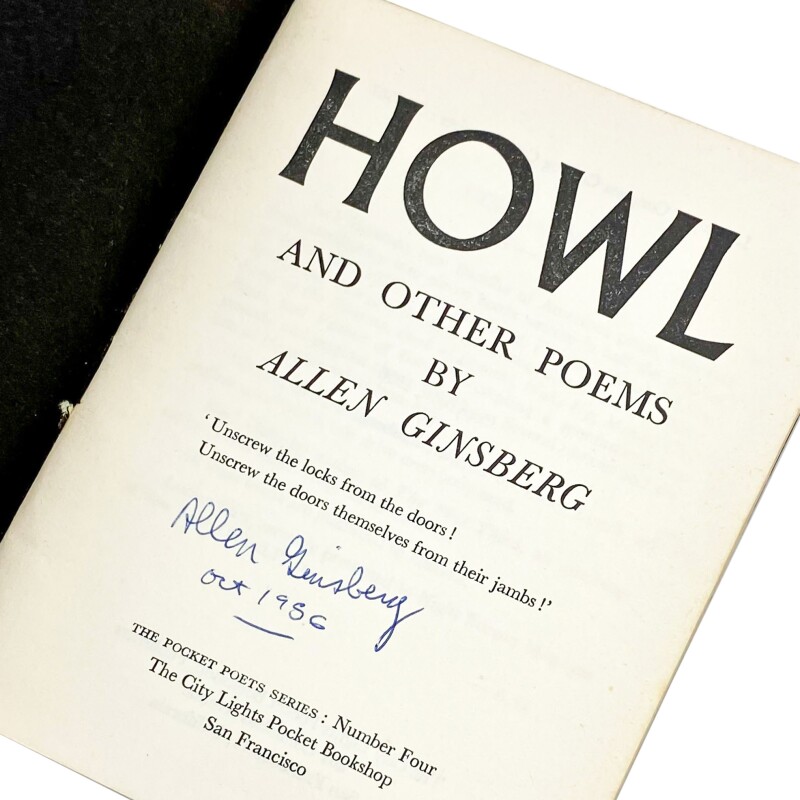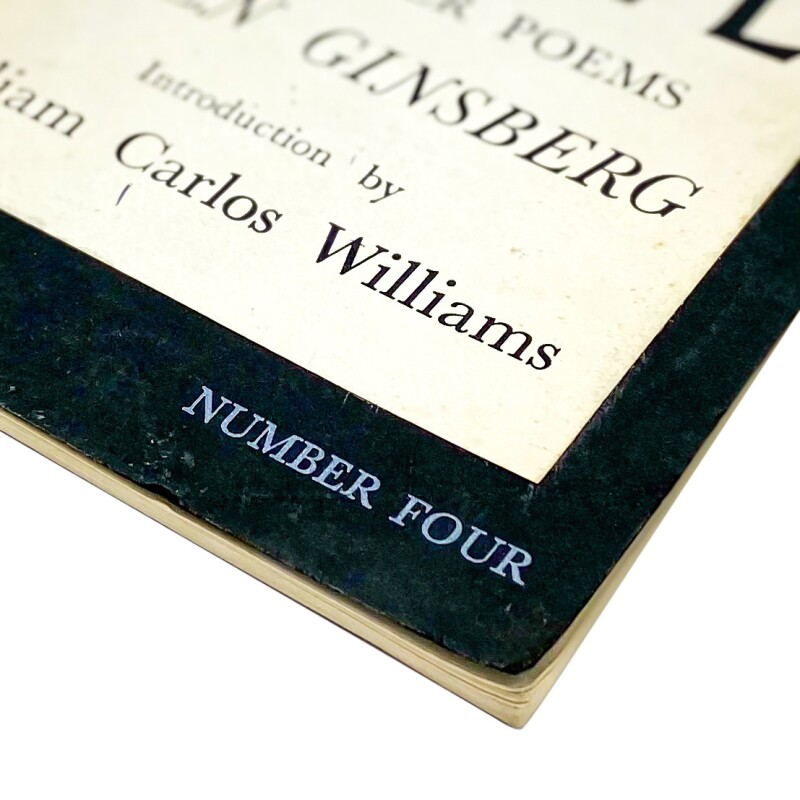






Allen Ginsberg
Howl and Other Poems
The City Lights Pocket Bookshop
1956
Complimentary shipping
Price:
International shipping available
Customs duties and taxes may apply.
Ships from: Maryland, United States
Taxes not included
VAT and other taxes are not reflected in the listed pricing. Read more
Authenticity guaranteed
We guarantee the authenticity of this item.
Details
Description
Rare signed first edition of Howl, inscribed in the year of publication, likely at one of Ginsberg’s most infamous readings.
- Allen Ginsberg (American).
- San Francisco: The City Lights Pocket Bookshop, 1956.
- One of a thousand copies.
- Signed and dated by Ginsberg on the title page: “Allen Ginsberg / Oct 1956.”
- Original stiff black stapled wrappers with pasted white printed wraparound label, as issued.
- Presented in a custom, full black goatskin, clamshell box.
“I saw the best minds of my generation destroyed by madness...” The most likely opportunities for Ginsberg to sign copies of Howl in 1956 were few and far between. First, the book was published late in the year. While Ferlinghetti sent Ginsberg “a few advance copies” in August of that year (Morgan, I Greet You, 5), and a small number of copies inscribed in September are known (the Sept. 17th issue of Publisher's Weekly lists the official publication date as Sept. 1st), Howl seems to have only really begun to be distributed in October. Again, according to Publisher's Weekly, “[t]he first edition passed through U.S. Customs in October, 1956” (April 29th, 1957). In addition, both Gary Snyder and Louis Ginsberg report receiving copies they had ordered at the start of that month, likely from the earliest copies received at City Lights. Morgan’s bibliography, however, sets the date of publication as Nov. 5th, which coincides with the book’s first notice, again in Publisher's Weekly (”[b]itterly impassioned”), but which further suggests Howl's distribution wasn’t really happening until well into October. And it was during October that the poet gave his only two public readings before the end of the year. The first was Oct. 21st, when both he and Gregory Corso read at the Poetry Center at San Francisco State (Corso’s first public reading). But curiously, Ginsberg did not read from Howl that evening, despite a large and expectant crowd—more than 500 people—and “[i]mmediately following the reading,” both poets “were anxious to get on the road” (Morgan, Celebrate, 224). The pair were hitchhiking south on their way to Mexico (where they would spend the month of November), but had an important stop in Los Angeles, where they had a reading scheduled for October 30th. Sponsored by the literary magazine, Coastlines, this small reading (held in a boarding house) would become one of Ginsberg’s most famous, second only to the Six Gallery in terms of notoriety. The best account of the event is from Lawrence Lipton’s 1959 memoir The Holy Barbarians. According to Lipton, Ginsberg was “reading from the book [Howl], which had just come out,” but was repeatedly interrupted by a drunk in the audience who jeered and heckled Ginsberg throughout. Ginsberg finished his portion of the event, but the matter came to a head when Corso got up to read. The drunk renewed his jeers and interruptions, eventually challenging Corso to a fight. At this point, Ginsberg stood up and countered that if the heckler wanted to do something truly brave, he would take off all his clothes. “The poet always stands naked before the world,” Ginsberg explained and proceeded to disrobe until he was standing stark naked before the drunk, now stunned into silence. From there the drunk backed down and even reportedly asked Ginsberg after the reading where he could get a copy of Howl for himself.
No matter where it was signed, however, copies signed in the year of publication are quite rare. There are only a handful inscribed in 1956, with most of those being associations of one form or another. A significant copy from early in the life of this landmark poem that, along with Kerouac’s On The Road and Burroughs’s Naked Lunch, form the cornerstone of the Beat movement. It remains Ginsberg’s most enduring work.
Condition Report
Mild soil, rubbing, edgewear.
Spine toned, as common.
Feature(s)
Language
Subject
Conditions of Business
Please note that the cancellation right for EU/UK purchasers applies to this item. Please read Condition 19 of the Buy Now Marketplace Conditions of Business for buyers for more information. Read more here.